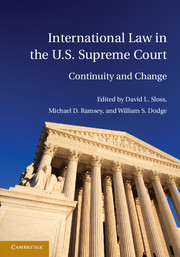Book contents
- Frontmatter
- Contents
- List of Contributors
- Table of Cases
- Acknowledgments
- Introduction
- PART I FROM THE FOUNDING TO THE CIVIL WAR
- PART II FROM THE CIVIL WAR TO THE TURN OF THE CENTURY
- PART III FROM THE TURN OF THE CENTURY TO WORLD WAR II
- PART IV FROM WORLD WAR II TO THE NEW MILLENNIUM
- PART V INTERNATIONAL LAW IN THE U.S. SUPREME COURT IN THE TWENTY-FIRST CENTURY
- V.A TREATIES AFTER 2000
- V.B CUSTOMARY INTERNATIONAL LAW AFTER 2000
- V.C INTERNATIONAL LAW AND CONSTITUTIONAL INTERPRETATION AFTER 2000
- V.D INTERNATIONAL LAW AND STATUTORY INTERPRETATION AFTER 2000
- V.E INTERNATIONAL LAW AND THE WAR ON TERROR
- Main Essay – The Supreme Court, the War on Terror, and the American Just War Constitutional Tradition
- Response Essay – Constitutional Resolve in a World Changed Utterly
- Response Essay – Judicial Imperialism and the War on Terror Cases
- VI CONCLUSION
- Index
- References
Main Essay – The Supreme Court, the War on Terror, and the American Just War Constitutional Tradition
Published online by Cambridge University Press: 05 July 2011
- Frontmatter
- Contents
- List of Contributors
- Table of Cases
- Acknowledgments
- Introduction
- PART I FROM THE FOUNDING TO THE CIVIL WAR
- PART II FROM THE CIVIL WAR TO THE TURN OF THE CENTURY
- PART III FROM THE TURN OF THE CENTURY TO WORLD WAR II
- PART IV FROM WORLD WAR II TO THE NEW MILLENNIUM
- PART V INTERNATIONAL LAW IN THE U.S. SUPREME COURT IN THE TWENTY-FIRST CENTURY
- V.A TREATIES AFTER 2000
- V.B CUSTOMARY INTERNATIONAL LAW AFTER 2000
- V.C INTERNATIONAL LAW AND CONSTITUTIONAL INTERPRETATION AFTER 2000
- V.D INTERNATIONAL LAW AND STATUTORY INTERPRETATION AFTER 2000
- V.E INTERNATIONAL LAW AND THE WAR ON TERROR
- Main Essay – The Supreme Court, the War on Terror, and the American Just War Constitutional Tradition
- Response Essay – Constitutional Resolve in a World Changed Utterly
- Response Essay – Judicial Imperialism and the War on Terror Cases
- VI CONCLUSION
- Index
- References
Summary
In a volume dedicated to the history of international law in the Supreme Court, it would be premature to attempt an assessment of the historical significance of the war on terror cases that the Court decided between 2004 and 2008. Yet, if their future impact is necessarily speculative, it is not too early to consider the decisions in a retrospective mode. Do they mark a radical departure from past understandings of the Constitution and of the role of the judiciary, as some have claimed, or are they consonant with the core themes of American constitutional history?
In this essay I argue that the decisions are very much in line with American constitutional history, but that they are so in a complex way. It should be candidly acknowledged that the Court did not hold itself bound to follow seemingly settled doctrines or the holdings of its previous war powers cases. Yet, in assessing the fidelity of the war on terror cases to American constitutional history, it would be a mistake to focus narrowly on doctrinal rulings and not to appreciate the profoundly different circumstances in which the earlier constitutional rules were developed. From this vantage point, the war on terror cases are indeed faithful to the spirit of the constitutional framework for war that has persisted throughout our constitutional history – what I call, with perhaps not a little aspirational content, our “Just War constitutional tradition.”
- Type
- Chapter
- Information
- International Law in the U.S. Supreme Court , pp. 561 - 574Publisher: Cambridge University PressPrint publication year: 2011

